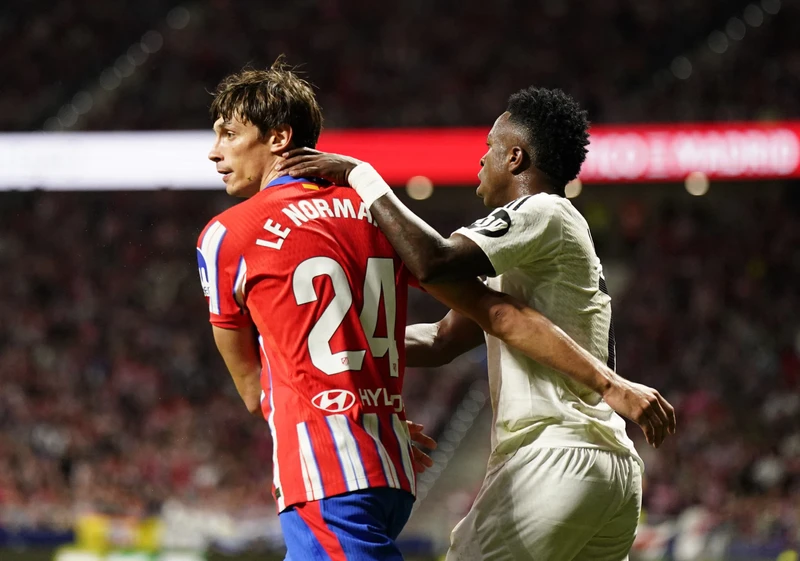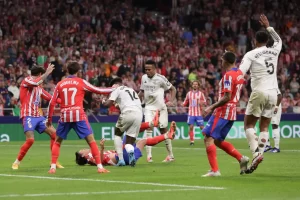Atlético Madrid Defender Robin Le Normand Suffers Traumatic Brain Injury After Real Madrid Clash
3 min read

In a troubling update following the recent LaLiga derby, Atlético Madrid announced that defender Robin Le Normand has been diagnosed with a “traumatic brain injury” after a collision during the match against Real Madrid. This injury occurred late in the game, which ended in a 1-1 draw.
The incident unfolded just moments before the final whistle, when Real Madrid midfielder Aurélien Tchouaméni attempted to head a cross from Lucas Vázquez. As Le Normand jumped to intercept the ball, he and Tchouaméni inadvertently collided, resulting in a severe impact. Le Normand fell to the ground immediately, visibly in distress, while Tchouaméni also went down, appearing to hold his head.
The match was halted as medical teams rushed to attend to both players. Le Normand was seen slowly walking off the pitch at the Metropolitano Stadium with the assistance of two Atlético medical staff, highlighting the seriousness of the situation.
On Tuesday, Atlético Madrid released a statement detailing the severity of Le Normand’s condition. The club clarified that the 27-year-old defender underwent extensive tests and evaluations by specialists. The diagnosis confirmed that he suffered a traumatic brain injury (TBI), accompanied by a subdural hematoma—an accumulation of blood between the brain and the skull.
The club emphasized the importance of following strict medical protocols for such injuries, stating, “In the process of returning our player to competition, the guidelines set out in the protocol established for this type of trauma will be followed.” This indicates a cautious approach to his recovery, prioritizing player safety above all else.
Le Normand has been a crucial part of Atlético’s defense and has earned his place as a Spanish international. His absence could significantly impact the team as they prepare for upcoming fixtures. The Colchoneros are set to face Benfica in a Champions League match at the Estadio da Luz in Portugal on Wednesday, and Le Normand’s injury adds an extra layer of concern for the squad.

This situation highlights the growing awareness of head injuries in sports, particularly in football, where such collisions are common. The protocols in place are designed to protect players from the long-term consequences of traumatic brain injuries, which can have lasting effects on health and performance. As Atlético Madrid navigates this challenging time, they will likely remain vigilant in adhering to these guidelines.
In light of Le Normand’s injury, there is an increased emphasis on player safety across the league. The incident serves as a reminder of the risks athletes face, particularly in high-stakes matches where physicality is paramount. As the football community rallies around Le Normand, supporters are hopeful for a swift recovery and a return to the pitch.
For now, Atlético Madrid will focus on their upcoming match against Benfica, with the team needing to rally together in the absence of one of their key players. As the club prepares for this important clash, the emotional toll of the incident is likely to weigh on both players and fans alike.
In conclusion, Robin Le Normand’s traumatic brain injury underscores the need for continued vigilance regarding player safety in football. As protocols evolve and the understanding of head injuries deepens, clubs must prioritize the health and well-being of their athletes. The hope is that Le Normand will make a full recovery and return to the game he loves, continuing to contribute to Atlético Madrid’s success in the future.